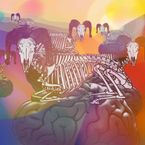Ways of coping with loneliness: clubs or companion robots?
The London Lonely Girls Club was established when its founder Holly Cooke felt lonely after moving to London. “It was really scary to admit that I was lonely and there were no people around me,” Holly recalls of the club’s Facebook beginnings. Five years later, the London Lonely Girls Club has more than 35,000 members who attend up to seven monthly events for women and non-binary people. These include, for example, picnics, art classes, jewellery workshops, sharing dinners and puppy yoga.
Researchers at Thriving Relationships Lab at Arizona State University are investigating, among other subjects, the relationship between humans, companion dolls, and sex robots. More and more people are interested in creating relationships with artificial companions. For some people, companion bots serve only to achieve sexual satisfaction. For others, they are full-fledged relationship partners, carers and interlocutors with whom daily life is shared. Some of the human-machine relationships studied have been going on for years.
The Gallup Institute estimates that more than 300 million people worldwide do not have even one friend, and one in five people do not have friends or family they can count on in difficult times. Feeling lonely entails adverse health effects: heart disease, stroke, cognitive decline, low immunity and Alzheimer’s disease. Loneliness also increases anxiety and depression.




























